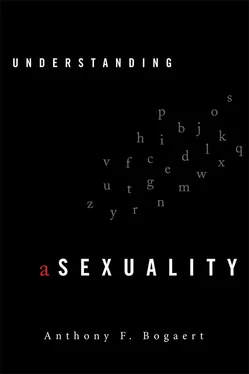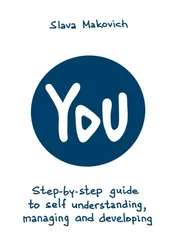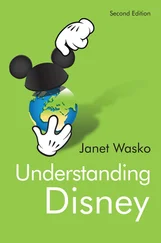Identities allow us to know who we are and to stake our claim as unique and worthy of recognition. They also allow us to seek solace and comfort with, and forge ties to, those with whom we share commonalities. Identities also often emerge out of and serve social and political ends, allowing us to rally our group in defense of our interests.
Sexual identities are especially powerful components of the broader human identity process. That many asexual people still want, or are compelled, to forge a sexual identity (i.e., as an asexual ) attests to the relevance and power of sex in our society. They are, like the potoroo, seemingly alone in a very large and different (sexual) world. Sexuality is also likely to be, at least for some, a very relevant personal construct, even if they do not engage in sex at all. It is as if these asexuals know that, on some very deep level, sex really matters in society, and therefore their own identities must also be defined by it, even if that identification takes on meaning because it is the polar opposite of sex. An asexual identity is also clearly relevant from a political standpoint, providing the ground support and a rallying point needed to change public perceptions and institutions that claim (or at least imply) that asexual people are ill or broken. That (public) identities are often political, and can serve as a way of gaining or defending psychic and other territory, is illustrated by the fact that groups often tend to lose their (unique) identity when the “war” is over and won (Associated Press, 2007; Scarr, 1987). For example, some recent stories on the gay and lesbian community illustrate how traditional elements of a gay/lesbian identity are being lost in the wake of increasing public acceptance. For asexual people, however, their war—and their need for a common identity to help fight it—has probably just begun.
CHAPTER 8
The Madness of Sex
One day in the locker room I overheard a conversation between a gregarious old man and his younger male friend. The conversation flitted among seemingly unrelated topics, but eventually landed on one that seemed to pique the old man’s interest more than others. He described, with some curiosity, how his interests in sex had changed: It no longer appealed. As an example, he noted that, these days, the famous and staggeringly popular Sports Illustrated swimsuit issue, sent to him as part of his regular subscription to this magazine, was “wasted.” The bathing beauties (meant to remind avid sports fans that there was, after all, one additional, equally important reason to live) were just a bit of an oddity to him. They “did nothing” for him. He concluded, to his own amusement, that perhaps if these women were carrying a steaming-hot pepperoni pizza, then maybe they would pique his interest!
Most sexual people have an understanding of this old man’s feelings. Sexual people can go through periods in their lives when sex holds little interest for them. Perhaps a stressful job, a tough bit of schooling, or a family tragedy is the cause of these relatively transitory bouts of sexual disinterest. And, of course, on a shorter time scale, in any given day, people have periods when sex—even if the opportunity presents itself to have sex with an attractive partner—is not appealing, or at least not uppermost in one’s thoughts. We are routinely occupied by the day-to-day realities of life, and sex may seem very unappealing (or even a bit alien) at any given moment. Even average adolescent males or young men, whose sex drives are said to be like an endless well, have a “refractory period,” which refers to a state of disinterest (or no arousal) after sex.
In such relatively sexless states, one’s higher-order, analytical thinking may hold sway, and thus one may wonder what all the fuss is about (see also chapter 1): Why is sex such an important and powerful influence in one’s life? One may even have a curious feeling—an aha! moment—that sex, if the truth be told, is a curious, even peculiar, activity and preoccupation. At such times, one has caught a glimpse of what I call the madness of sex . You could also call it, perhaps, an asexual’s perspective on human sexuality.
Incidentally, I knew a college professor who called adolescence the state of “testosterone poisoning.” He was trying to be funny, of course, but his description of adolescence also captures the same underlying idea here: that the activities of, and preoccupation with, sex (along with the hormone that provides some of the motivation for it, testosterone) can be seen as a kind of odd—even mad—state of mind. And certainly, as mentioned in chapter 1, if one views sex from a distance (“deconstructs” it, if you will), it can be seen as comprising a host of symptom-like behaviors—obsessive thoughts, odd vocalizations, repetitive movements, and so on—reminiscent of a mental disorder.
Most, if not all, sexual people, then, may have some understanding of what it would be like to be asexual all the time . They might even wonder whether asexual people have a special knowledge, seeing sex for what it truly is: a rather strange preoccupation partly induced by a brain poison (i.e., hormones). Prepubescent children (i.e., before their hormonal surge) often have this view of sex, wondering why in heaven’s name would someone want to do that , as if it were as sensible and pleasurable as repeatedly sticking one’s finger in another’s ear. Perhaps prepubescence can be construed as a form of asexuality or, more accurately, as a related phenomenon: presexuality.
On the AVEN website, comments at times appear about the strange, nonsensical activities of sexual people. I hear that AVEN webmasters sometimes have to rein in some of the more extreme and disparaging comments on these strange activities of sexual people. It reminds me of the disparaging rant that some gay people hurl at heterosexuals: Breeders ! I suppose this comment is meant to suggest that the heterosexual habit of overpopulating a fragile planet with their offspring is, well, a bit self-centered and gauche. Both views have merit perhaps, and maybe there are webmasters reining in breeder rants on gay/lesbian sites as well.
The view that sex is odd is sometimes afforded to people when exposed to sexual activities that they don’t find stimulating. Heterosexual men, for example, may find gay porn to be curious, even amusing, rather than titillating or deeply arousing. When they watch it, they may feel like an observer watching someone sticking a probe into a friend’s ear, and although it is clear that both the prober and the one being probed find (or feign) this activity deeply interesting and satisfying (e.g., by their vocalizations or other telltale signs), the heterosexual viewer may feel that there is no apparent reason for this activity. Thus, they are left with a largely curious, even amused reaction. There is a scene in the movie The Kids Are Alright in which a lesbian couple is turned on by gay (male) porn and incorporates it into their lovemaking (Gilbert et al., 2010). The movie shows snippets of a gay porn movie, but the sex scenes are played up in such a way as to seem amusing. I think the filmmakers were playfully suggesting, perhaps in line with the themes of the movie, that any sex is a bit odd (regardless of the players) and can be viewed with curious amusement when seen from the outsider’s perspective. It just so happens that the viewers (in the audience) are likely predominantly heterosexual, as they are the majority in society, but it could be the other way around: gay people viewing heterosexual porn—or, more to the point, asexual people viewing any porn (but see chapter 10).
Even while in the throes of sexual acts themselves, sexual people may have some understanding of the feverish madness of sex. Thus, if a heterosexual woman has an exciting new sexual partner and he is nearly all-consuming for her, she may still have, in moments of reflection, some knowledge of how her recent life has turned upside down because of him. An even more extreme example is a married heterosexual man who spends an inordinate amount of time and money on prostitutes. Yet on some level he “knows” that his behavior is irrational. He may even know that he is on the verge of ruining his life, as his job and family life are at stake. Some clinicians, of course, call this kind of sexual behavior an addiction.
Читать дальше












